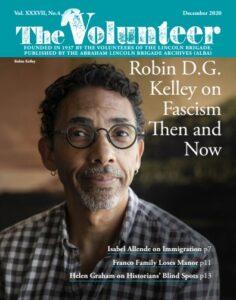Letter to the Editors: (De)Politicizing the Spanish Civil War
Prof. Helen Graham’s “Why Do So Many Historians Fail to Understand the War in Spain” (December 2020) is a patent attempt to de-politicize the reasons behind and motives for the International Brigades. To use general terms like humanitarian, displacements, migration, ethnicity, and high politics without specifying their context—namely the resistance to absolute monarchy, religious oppression, feudal landlords, suppression of trade unions, colonial rule; in a word, the struggle against clerical fascism—is to mask history. While there obviously was “no perfect symmetry between communist affiliation and support for the republic in Spain,” often Communists played a major role defending the Spanish republic. Anti-communists of all stripes, including liberals, volunteered for the International Brigades. What they shared was a burning desire to defeat fascism. Sadly, they fought among themselves over how to achieve that aim.
Graham prefers to focus on such factors as the massive displacements after the First World War, migration, and colonialism. Clearly, none of this precludes political motivations for going to Spain to fight reaction. It is well documented that many of the volunteers in Spain were Communists or shared similar sympathies. The meaning of such commitment, even in the period under review, is difficult for many to understand. But it is this understanding that is needed, not its denial.
David Oberweiser Jr.
Helen Graham responds:
David Oberweiser seems to have read my article entirely at cross purposes. Nothing in it queries—still less “denies”—the political commitment of the international volunteers who defended the Spanish Republic. I’ve written about that commitment extensively over the years, including in the pages of The Volunteer. But my purpose in this article was to widen the lens, in order to trace how that political commitment came to be made in the first place, in the cross-currents of huge changes accelerating after World War One, including of course changes that were occurring in people’s heads. In particular I wanted to foreground what is still the least-known part of the International Brigade story even today: Everyone understands the volunteers were politically engaged, but far fewer know (because most English-language accounts don’t tell them) that the vast majority of volunteers came from central-east and south-east Europe.
These young men—from Poland, Hungary, Romania, Greece, Yugoslavia—had been farm hands or urban workers and when they returned from the fighting in 1918, they found the “old world” order under swift reconstruction. But they were now no longer prepared to tug the forelock or offer “due deference” to their “betters.” They had aspirations to something else, a life worth living, a more equal social order—and so they set off. What they were leaving behind was of course precisely the repressive old order of church, landed elites, and authoritarian monarchies (sometimes in alliance with fascists) to which David Oberweiser refers, and against which in Spain they made a stand, on behalf of all of Europe, and indeed the world beyond. So, far from migration being at odds with the making of left/antifascist political commitment and social consciousness, it’s actually at the heart of it. Many of those central/south east Europeans who came to fight in Spain arrived via third countries where they’d already been migrant workers—the largest single IB contingent came from France, but it was composed of several nationalities, including many Poles. This was also later reflected in the international, and multiethnic, composition of the antifascist resistance movement in France during World War II, and indeed in the very name of one of its famous components, the communist-allied Main-d’oeuvre Immigrée or migrant labor front (MOI).
It’s true that I did perhaps frame my Volunteer article a tad abstractly, but I had very few allotted words! My preference is always to anchor the bigger picture in stories of real human lives. The thousands of European migrants and exiles—whether communists, anarchists, or socialists—had strong political ideas, but they also “believed” in a holistic way. It was a way of traveling hopefully in dark times. As I’ve written elsewhere, “political activism was itself a way of acquiring human agency, a form of body armor, donned by the least powerful in the hostile climes of giddying change which characterize these core interwar decades of Europe’s twentieth century.”
It’s important for us to recognize this, because it debunks what is the real “distortion” here—the baleful influence of the Cold War in the telling of what happened in Spain. An apparently never-ending Cold War still to this day (re)presents the international volunteers as if they were ideological robots—thus conveniently closing down any discussion of the larger historical stakes.
My own article, in contrast, underlines those very stakes, how the fight in Spain was at the heart of a struggle against Europe’s “old world,” against its rigid social and political hierarchies, and in favor of a more equal distribution of power—indeed in favor of civil rights—all of which was unleashed by World War I.














